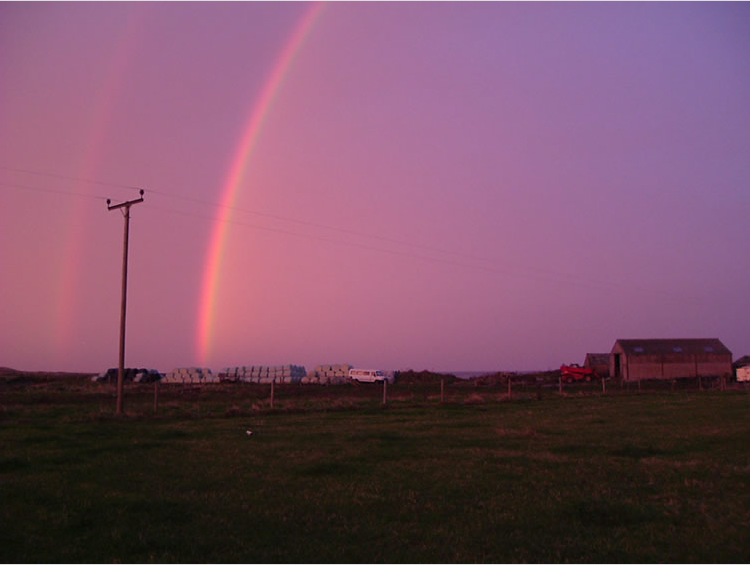Red Rainbows - Orkney, Scotland
Red Rainbows - Orkney, Scotland: A Rare and Enchanting Sight
Have you ever witnessed a red rainbow? If not, you're in for a treat! Red rainbows are a captivating atmospheric phenomenon that can be seen in various parts of the world, including the picturesque Orkney Islands in Scotland. These extraordinary optical displays occur when the direct rays of the setting sun are highly reddened due to scattering by aerosol, dust, and air molecules. In this article, we will delve into the mesmerizing world of red rainbows and explore their unique characteristics.
The Science Behind Red Rainbows
Red rainbows, also known as monochromatic rainbows, are a rare occurrence compared to their more commonly observed counterparts - primary and secondary rainbows. While primary and secondary rainbows display a range of colors, red rainbows are predominantly composed of hues in the red spectrum. This striking coloration is a result of the intense scattering of shorter wavelengths of light, such as blue and green, by tiny particles suspended in the atmosphere.
The Role of Aerosols and Dust
Aerosols and dust play a crucial role in the formation of red rainbows. These microscopic particles serve as scattering agents, dispersing light in different directions as it passes through the atmosphere. When the sun is low on the horizon during sunset or sunrise, its rays have to travel through a larger portion of the atmosphere, encountering a greater number of aerosols and dust particles. This amplifies the scattering effect, causing more intense coloration and giving rise to red rainbows.
The Influence of Air Molecules
In addition to aerosols and dust, air molecules themselves contribute to the reddening of sunlight during sunset or sunrise. As sunlight passes through the Earth's atmosphere, it undergoes a process called Rayleigh scattering, where shorter wavelengths are scattered more than longer wavelengths. This scattering phenomenon causes the blue and green components of sunlight to disperse, leaving behind the redder hues. Consequently, when raindrops refract and reflect these reddened rays, red rainbows emerge as a breathtaking spectacle.
The Beauty of Orkney's Red Rainbows
The Orkney Islands in Scotland provide a stunning backdrop for observing red rainbows. These archipelagos are renowned for their picturesque landscapes, rich history, and vibrant culture. The combination of the islands' natural beauty and the ethereal sight of red rainbows creates a truly magical experience for those fortunate enough to witness it.
Capturing Red Rainbows: Shane Hourston's Perspective
One individual who had the incredible opportunity to witness and photograph a red rainbow in Orkney is Shane Hourston. At the age of nine, Shane captured a remarkable image of a red primary and secondary rainbow during late summer in 2006. His photograph beautifully showcases the vivid red hues caused by the scattering of sunlight by aerosols, dust, and air molecules. This image serves as a testament to the captivating allure of red rainbows and the awe-inspiring moments they create.
Exploring the Rarity and Significance
While primary and secondary rainbows are relatively common atmospheric phenomena, red rainbows are much rarer. Their occurrence depends on specific atmospheric conditions, including the presence of abundant aerosols, dust particles, and the angle at which sunlight enters the atmosphere. This rarity adds to the allure of red rainbows, making them a highly sought-after sight for both scientists and nature enthusiasts.
Red Rainbows Around the World
Although red rainbows are infrequent, they can be observed in various locations worldwide under specific atmospheric circumstances. Besides Orkney, Scotland, other regions known for their occasional red rainbows include:
- The American Southwest, particularly during periods of dust storms.
- Volcanic areas with abundant ash particles suspended in the air.
- Arctic regions where ice crystals in the atmosphere contribute to the scattering effect.
Unveiling the Magic of Red Rainbows
Red rainbows are truly a mesmerizing and enchanting phenomenon. Their vibrant red hues, caused by the intense scattering of sunlight by aerosols, dust, and air molecules, create a sight that is both rare and captivating. Whether witnessed in the breathtaking landscapes of Orkney, Scotland, or other parts of the world, red rainbows serve as a reminder of the wonder and beauty of our natural world. So, keep your eyes to the sky and be prepared to be dazzled by the elusive and magical display of a red rainbow.

Red primary and secondary rainbows.
Taken on the island of Orkney, Scotland in late summer '06 by (then) nine year old Shane Hourston.
The direct rays from the setting sun are highly reddened from scattering by aerosol, dust and the air molecules themselves.
Image ©2006 Shane Hourston, shown with permission.
Note: this article has been automatically converted from the old site and may not appear as intended. You can find the original article here.
Reference Atmospheric Optics
If you use any of the definitions, information, or data presented on Atmospheric Optics, please copy the link or reference below to properly credit us as the reference source. Thank you!
-
<a href="https://atoptics.co.uk/blog/red-rainbows-orkney-scotland/">Red Rainbows - Orkney, Scotland</a>
-
"Red Rainbows - Orkney, Scotland". Atmospheric Optics. Accessed on November 26, 2024. https://atoptics.co.uk/blog/red-rainbows-orkney-scotland/.
-
"Red Rainbows - Orkney, Scotland". Atmospheric Optics, https://atoptics.co.uk/blog/red-rainbows-orkney-scotland/. Accessed 26 November, 2024
-
Red Rainbows - Orkney, Scotland. Atmospheric Optics. Retrieved from https://atoptics.co.uk/blog/red-rainbows-orkney-scotland/.